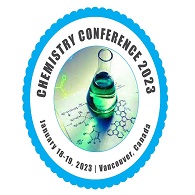Call for Abstract
Scientific Program
13th International Conference on Chemistry and Medicinal Chemistry, will be organized around the theme “Theme : Discovering the Scientific and Innovative progressions in Medicinal Chemistry”
Chemistry Conference 2023 is comprised of keynote and speakers sessions on latest cutting edge research designed to offer comprehensive global discussions that address current issues in Chemistry Conference 2023
Submit your abstract to any of the mentioned tracks.
Register now for the conference by choosing an appropriate package suitable to you.

